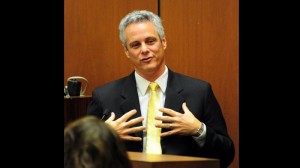
Dr. Alon Steinberg gestures on the witness stand during Dr. Conrad Murray's trial in the death of pop star Michael Jackson in Los Angeles. AFP/ROBYN BECK
LOS ANGELES — Michael Jackson could have been saved if his doctor had simply called 911, a senior medic said Wednesday as lawyers dropped a claim that the star may have drunk a killer drug overdose himself.
Cardiologist Alon Steinberg blasted Conrad Murray, on trial over Jackson’s 2009 death from an overdose of propofol, saying the doctor should simply have called 911 as soon as he saw the star had stopped breathing.
“It’s basic knowledge in America, you don’t have to be a health care professional, that when someone is down you need to call 911 for help,” Steinberg told jurors in gripping testimony.
Murray says he left Jackson for two minutes to go to the bathroom on June 25, 2009, and returned to find him apparently lifeless.
“When you monitor a patient, you never leave their side, especially after giving propofol. It’s like leaving a baby that’s sleeping on your kitchen countertop,” said Steinberg.
Murray is accused of giving Jackson an overdose of propofol while trying to help him sleep. His lawyers have claimed Jackson was a desperate addict who gave himself a fatal extra dose while Murray was out of the room.
But on Wednesday, in a surprise move before the jury came into court, one of Murray’s lawyers announced they were dropping the claim that Jackson could have drunk a killer overdose.
“We are no longer contending that propofol was orally ingested in this case,” said Michael Flanagan, a member of Murray’s legal team fighting to clear the medic of an involuntary manslaughter charge.
The move came after Murray’s lawyers have shifted attention to the role of other drugs in Jackson’s death, notably lorazapam, which an autopsy found contributed even if “acute propofol intoxication” was the main cause of death.
The 58-year-old doctor has admitted to giving Jackson 25 milligrams of propofol around 10:40 a.m. on the day he died, after the star had been awake all night, despite being given a series of doses of other less powerful sedatives.
The theory that Jackson could have drunk more propofol, which the star referred to as “milk,” while Murray was out of the room has been countered by evidence that no propofol was found in his stomach.
But it is unclear whether Murray’s lawyers have completely abandoned the theory that Jackson self-administered the propofol — in theory he could have done so via an intravenous tube in his leg.
In a police interview played at the trial, Murray recounted how he had been treating Jackson for about two months as the star rehearsed in LA for a series of comeback shows in London.
On the day Jackson died, Murray gave Jackson a series of intravenous (IV) injections of sedatives lorazepam and midazolam starting at 1:00 am and through the night, but the star remained awake.
After finally giving him 25 milligrams of propofol at 10:40 a.m,. Murray monitored Jackson for an unspecified period, before going to the bathroom.
When he found the star lifeless upon his return, Murray began trying to revive him, but instead of calling 911, he called Jackson’s personal assistant, who then called a security guard, who eventually called 911 at 12:20 p.m.
Steinberg, a senior member of the California Medical Board, noted that paramedics arrived at the house only six minutes later — a period of. time that could have saved Jackson’s life if they were called immediately.
“If they had gotten there six minutes later [from when Murray found the singer not breathing], Michael Jackson would still be alive,” he said.
The trial in Los Angeles Superior Court is expected to last five weeks, until the end of October. If Murray is convicted, he faces up to four years in jail.